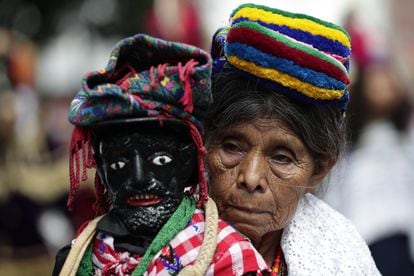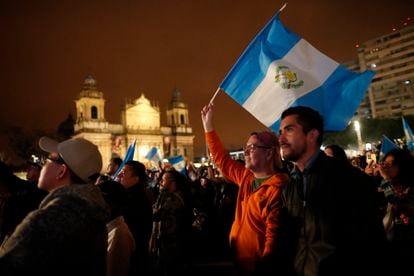Bernardo Arévalo (Montevideo, 65 years old) is finally president of Guatemala. The president was sworn in in a ceremony at the Miguel Ángel Asturias cultural center that began around midnight after a long day in Congress that lasted more than 12 hours and in which some deputies staged a show that shows how the forces that the president had been denouncing for months were trying to prevent his inauguration.
The attempt by some deputies to torpedo the transfer of command, delaying the investiture ceremony for nine hours, was broadcast and denounced at the minute by the international delegations that came to accompany the new president. The long delay caused, however, some of the guests to leave before the swearing-in, such as the King of Spain, who left the theater after ten thirty at night, or the Chilean president, Gabriel Boric, who excused himself. saying that he had to return to his country.
Arévalo received the presidential sash and the key to the Constitution from a young deputy of his party, Samuel Pérez, who at 31 years old is already in his second term and managed to be elected president of Congress in a great victory for the ruling party, which It gained the necessary support despite the fact that the Semilla Movement is the third force in the chamber. After reaching that agreement to form the board of directors after 10:30 at night, the congressmen traveled by bus to the cultural center to continue the session and swear in the president and vice president, Karin Herrera.
Born in Montevideo (Uruguay) and son of former Guatemalan president Juan José Arévalo (1945-1951), the new president won the August elections in a surprise way with the promise of fighting the corruption that corrodes everything in Guatemala and putting a stop to authoritarianism in boom in recent years. It will not be easy with part of the judiciary against it and a minority in Congress.
Precisely Parliament became the protagonist of the day. What should have been a five-hour protocol act for the swearing-in of the deputies and the appointment of the board of directors was extended for more than 12 hours between delays considered malicious and brawls between deputies in which even the Court of Justice was forced to intervene. Constitutionality.
While Congress raised uncertainty and even doubts about whether they were finally able to complete a necessary procedure for Arévalo's investiture before midnight, as stipulated by law, tension increased in the streets and among the international delegations that arrived in Guatemala to accompany to Arévalo in the transfer of command.
The citizens, who from early in the morning arrived at central points of the capital to participate in the celebrations that were planned in the Plaza de la Constitución, moved to the surroundings of Congress to demand that the deputies do their job to invest to Arévalo, as the citizens decided at the polls. For their part, the indigenous movements that have been holding a sit-in in front of the Public Ministry for 105 days in defense of democracy in the face of judicial attacks to try to invalidate the elections, spoke out in the same sense and made a call to the population of other territories to mobilize if necessary.
International complaint at the minute
“Deputies have the responsibility to respect the popular will expressed at the polls. They are trying to violate democracy with illegalities, trifles and abuses of power,” Arévalo warned after 4 in the afternoon, when he saw his inauguration bogged down by the congressmen. “The Guatemalan people and the international community are watching.” The president spent hours of waiting and uncertainty in a hotel in zone 10 of the capital where his international guests were also present, increasingly concerned about the attempts to derail the investiture. The complaints and warnings from him would not take long to arrive.

One of the most energetic in publicly condemning what was happening has been the president of Colombia, Gustavo Petro. “The prosecution has been the orchestrator of a coup d'état. “Congress has made it difficult for the president-elect to take office,” the president wrote on his social network account X —formerly Twitter. And he said that he would not leave the country until Arévalo was sworn in as president, even if that meant missing the trip to Davos (Switzerland) to participate in the World Economic Forum. The Colombian president is aligned with Arévalo's message of fighting corruption, especially due to his closeness with his Minister of Defense, Iván Velásquez, who chaired the International Commission Against Impunity of Guatemala (CICIG), before being expelled from the country.
The Chilean president, Gabriel Boric, also showed his support for Arévalo, who criticized the “latest crude attempts by some sectors” to prevent him from taking office. The president was one of those who was left without accompanying his counterpart at the swearing-in because he had to return to his country to fulfill his commitments. “I leave with the peace of mind that Guatemala and Bernardo Arévalo know that they have in Chile and in our Government an ally for the democratic construction of a more just society,” he said.
The international delegations present in Guatemala also signed a document in support of the president and democracy that was read by the Secretary General of the Organization of American States (OAS), Luis Almagro, surrounded by the Spanish Minister of Foreign Affairs, José Manuel Albares, the Chancellor of Mexico, Alicia Bárcena, the president of Costa Rica, Rodrigo Chaves, the vice president of Brazil, Geraldo Alckmin, or the high representative of the European Union for Foreign Affairs and Security Policy, Josep Borrell. The latter also warned that he would propose to EU member states “the application of individual restrictive measures
against members of Congress that prevent the transfer of powers.”
While in Congress the latest attempts to derail the results of the elections that have kept part of the country in suspense in recent months were seen, in the streets the peaceful spirit that Guatemalans have shown in their firm defense of democracy. The Plaza de la Constitución, emblematic for the new Government for being the place where the Semilla Movement was born in the heat of the anti-corruption protests of 2015, was filled with citizens who waited patiently for hours, celebrated and danced to the rhythm of the concerts planned by the investiture and finally, around 12:30 at night, they breathed a sigh of relief and shouted “Yes we could.”

#Arévalo #takes #president #Guatemala #Congress39s #attempt #torpedo #investiture